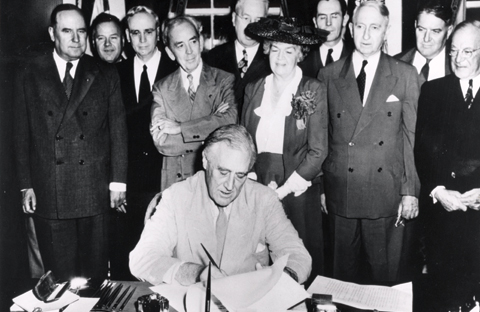From the Desk of John Hanson, SVP of Communications a the USO:
Don’t worry … this isn’t a civics lesson encouraging you to vote in every election (you really should, though).
Sometime this summer, the world will not celebrate the 66th anniversary of a piece of landmark legislation. Not because it’s bad legislation, but because 66 years isn’t as much fun as, say, 65 or 70.
In 1944, a group of World War I veterans figured out that World War II was going to be ending at some foreseeable time. The allies were advancing in every theater.
These men had come home after their war and learned some important lessons. One was that there had to be a way to assimilate millions of veterans back into an economy that was not going to be as robust after the war as it was during the war.
And, these folks had seen what happened when bonuses promised to World War I veterans were not paid. The bonus marchers’ riots in 1932 in Washington left a lasting impression and a bitter taste.
The result of their conversations was the Servicemen’s Readjustment Act of 1944.
[caption id=“attachment_1790” align=“aligncenter” width=“480” caption=“President Franklin D. Roosevelt signing the G.I. Bill into law on June 22, 1944”] [/caption]
[/caption]
It was ambitious. The plan included months of unemployment compensation, guaranteed home loans, and, remarkably, education benefits at colleges, universities and trade schools. The cost was going to be huge.
There was some consternation from the Congress. “This is far too expensive,” some said. “We can’t afford to do this.” Some called it socialistic or even communistic. There are reports that it was too big for even President Roosevelt. University leaders were worried about opening the doors of higher education to the hoi polloi.
But, a few veterans’ groups and interested citizens insisted, and the legislation moved forward, back and forth until the House and Senate versions had to be meshed. That shouldn’t have been a problem. Each house’s version passed unanimously. But, we’re talking about Congress, here. There were 7 members of the joint committee. One was going to be out of town when the vote was to be taken, and he left his proxy with the chairman. The chair decided not to vote the proxy, so the absent member, from Georgia, John Gibson, had to be found at his home, driven to an airport and flown back to Washington to cast the final vote that freed the bill for consideration.
A tie vote could have killed the bill. A desperate measure saved it.
You might recognize the Readjustment Act (a great name by the way) as its more popular title – the GI Bill of Rights. It changed the course for millions of veterans and their families. It created the American middle class. It created the America we take for granted today. By a one vote margin.
[ed. note - more information on the GI Bill is available online from the American Legion]
Every day, America’s service members selflessly put their lives on the line to keep us safe and free. Please take a moment to let our troops know how much we appreciate their service and sacrifice.

